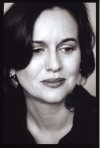Delia Falconer

Delia Falconer is the author of two novels: The Service of Clouds (1997) and The Lost Thoughts of Soldiers (2005). She is also the author of Sydney (2011), and editor of The Penguin Book of the Road (2008) and Best Australian Stories (2008 and 2009). She lives in Sydney.
‘A crystal atmosphere reflecting a liquid blue never excelled in purity even by soft azure splendour hung over the old Venetian palaces by the magic brush of Turner, lay on the mountain tops throughout the weekend. Sunshine illumed the crags and played fantastic vagaries of colour amidst the fresh foliage, gleaming in gilded beauty on the outer fringe of fern curtains and throwing into deeper sh ... (read more)
Story collections, especially ones that appear annually, hold out shimmering, Brigadoon-like hopes for their readers: that they will offer a snapshot of the times; capture the collective unconscious of a nation and its writers; and, if selected by a well-known writer, reveal something profound about that author’s tastes. Most editors will tell you that the reality is often different. Their wish- ... (read more)
Cate Kennedy’s name will be familiar to anyone who takes even the vaguest interest in Australian short story contests. Over the last decade, she has racked up an impressive list of awards in regional competitions, but readers are most likely to have noticed her successes in two of the most high-profile ones. In 2001 she took out the prestigious and now-defunct HQ Magazine short story competition ... (read more)
My first thought on reading Father Lands was of Lasse Hallström’s film My Life as a Dog (1985) in the way that both novel and film enter so completely and unerringly into the world of childhood with all its quirks, illogicality, and fears. But there are other traditions at work in this novel, set in Milwaukee in the mid-1970s, and which recounts Cherry Laurel’s experience of the ‘Historical ... (read more)
I am still puzzling over why Ross Fitzgerald and Ken Spillman chose the odd title, Fathers in Writing, for this anthology of personal essays. Because of its academic resonance, I first assumed that this book would be a scholarly analysis of father figures in literature – or, perhaps, following on from the work of certain feminist theorists, that it would look at how different valorisations of ... (read more)
American English, with its vigorous ability to get to the core of things, has an implacably visual word for the kind of person this novel is about – the ‘shut-in’. A shut-in is a recluse, perhaps a cinéaste or stay-at-home opera queen. He (I use my pronouns advisedly – the shut-in is usually a ‘he’) has a rich, century-long genealogy in books and on-screen, from Huysmans’s Des Essei ... (read more)
A friend describes the sensation as being in the movie set of your own life: everything is familiar, but not quite right. Auckland feels like an Australian city that has simply slipped a little, like the accent, to the east. There are hints of Hobart in the crisp sea and the misty sketched-in headlands. And of Sydney, in the over-abundance of harbour, the narrow streets of Ponsonby, which drop awa ... (read more)
From at least the mid-1980s, it has been almost obligatory for Australian reviewers to bemoan the dearth of contemporary political novels in this country. In some ways, this is a predictable backlash against the flowering of postmodern fabulist novels of ‘beautiful lies’ (by such writers as Peter Carey, Elizabeth Jolley, and Brian Castro) in the past two decades. And it is also a reaction agai ... (read more)
Robert Dessaix’s authorial voice reminds me of Christina Stead’s description of a small, clear wave running up a beach at low tide, playfully ‘ringing its air-bells’. He is not a writer of direct, declarative prose. Instead, Dessaix specialises in sentences that skip over and around their subjects, sometimes darting nimbly into brackets to investigate a second (or a third) thought, or dive ... (read more)
